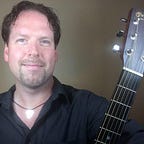9 Guitar Myths Every Beginner Guitar Player Needs To Know! Save Decades Of Confusion, Frustration,
And Get On The Path To Mastering The Guitar
The following pointers are gained from decades of playing and teaching guitar to thousands of people all over the world in 130 countries. My desire is to help you gain clarity and focus to improve your playing without the decades of frustration that I and many others have had to go through. Enjoy!
Myth 1| Learning music theory steals creativity/ I don’t want to be restricted by rules etc…
This one could come from a couple of different sources.
1st, Are less than ambitious fellow guitar players that just don’t want to put in any effort to learn music theory.
2nd Can stem from the fact that people don’t learn enough theory to help their playing and writing out. When you only learn a little bit it can feel like you are restricted to just a few patterns that you know
The Truth:
Is that music theory isn’t rules. A better way to think about it is that music theory terms are labels for why things sound the way they do.
Most guitar players can tell when something OBVIOUSLY doesn’t sound right, but when music theory REALLY helps is when you aren’t sure what to do next. Either when improvising or when writing music.
Myth 2| Books, Courses, Lessons On “Beginner” Guitar Are Focused
On Fundamentals.
The Truth:
“Beginner guitar” should be rebranded as “Common” Guitar”.“Beginner guitar” is designed to get you to SOUNDING LIKE YOU KNOW what you are doing to a non-musician, but NOT ACTUALLY KNOWING what you are doing.
The Result:
You end up skipping the TRUE fundamentals in favor of becoming an average guitar player that will hit all the common brick walls and pitfalls that everyone else hits that stops progress dead in your tracks
Myth 3| Beginner Guitar Chords Are Easier
The Truth:
Beginner guitar chords are actually more difficult than many other chord voicings that you could choose that are easier and would build up your finger strength and give you more options to play making your playing more interesting. Some voicings that even more advanced guitarists don’t have under their fingers
Myth 4| Self-taught Players Are More Talented
The Truth:
Nobody is truly self-taught, definitely not today. I think this one stems from the idea that people want to be thought of as gifted or naturally talented.
While there are people who seem to be hardwired for guitar, particular skills may come easier. I’ve seen people with more innate ability on guitar get surpassed by people who just simply never stop learning and practicing. Persistence pays off.
Myth 5| The More Scale Patterns I Know, The Better Soloist I Will Be
The Truth:
While there is nothing wrong with knowing scale patterns, the overemphasis on practicing scales is what gives guitar players a bad name.
This is why most advanced guitarists don’t study other guitar players, but actually study piano players and horns like the saxophone, trumpet, clarinet etc.. they don’t see their instrument as a grid or piece of graph paper. They solo over the chord.
Most scale players can’t target notes in the chord they are soloing over. They fall onto the notes when either ascending or descending with the scale pattern they practiced. They can’t target the chord tones. This is why people that shred scales flawlessly can get boring.
Myth 6| Practice Physical Techniques Before Learning The “What and Why”
The Truth:
The musical idea should dictate what the physical practicing and exercise focus time should be.
This is why guitar players can waste years, if not decades on scale patterns that they don’t really know how to use what you practiced. This way your technique will develop around musical ideas, not the reverse
Myth 7| You Should Learn Theory On The Guitar.
The Truth:
Music theory is easier when you learned it separately from the instrument. This way you can focus on understanding the hidden musical patterns that will give you more musical options, then you can apply it to whatever instrument you choose.
Guitar has the most confusing layout of any popular instrument, that is why guitar players get so frustrated, confused, and wind up quitting because they feel lost and don’t know where to focus practice time.
Myth 8| You Need Sight-Reading To Understand Music Theory.
The Truth:
No. Sight reading is a very valuable skill when composing music for an orchestra, or when you’ve never heard a piece of music and want to play it perfectly right from the start.
Conceptually though, you don’t need it to understand the main concepts of how chords, scales, keys, and the guitar layout work.
Myth 9| The Most Impressive Guitarists Are The Most Knowledgeable
The Truth: You would be astounded at the flashy guitar players that can barely play chords. They just don’t know the chords. A complete guitar player should be able to do both so you can improve your technique and have better musical ideas.
The Pareto principle applies here. (80/20 Rule). Most guitar players have it backward when it comes to their priorities. The Majority of playing guitar is 80 CHORDS and 20% Lead.
Not the other way around.
In Closing, I hope these few tips can steer you in the right direction by eliminating some of the false assumptions that are out there. My experience with this comes from teaching thousands of guitar players all over the world.
